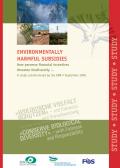This report examines how budgets can be greening by pricing carbon and cutting environmental harmful subsidies. The publication provides lessons on how greening the budget combines fiscal responsibility with the environmental sensibility that is inevitable for a sustainable future.

This Green Budget Germany (GBG) study commissioned by the Deutscher Naturschutzring (DNR) is an analysis of the comprehensive literature available on environmentally harmful subsidies and financial incentives. It presents case studies from around the world and makes proposals on dismantling subsidies.
This report was commissioned by the Deutsche Gesellschaft für Technische Zusammenarbeit (GTZ) GmbH and written by Green Budget Germany. Its objective is to present an analysis of economic instruments in use in selected OECD and Latin American countries in the areas of waste prevention and integrated municipal and commercial waste management. Economic instruments identified in the countries of the case sample are: municipal waste charges, landfill taxes, landfill permit trading schemes, deposit-refund schemes and Advanced Recycling Fees.
This document reviews literature to provide a background for the CDKN research project "Gender equality and Climate Compatible Development- Drivers and challenges to people’s empowerment". The project addresses major knowledge gaps in relation to the gender dimension of climate change mitigation, adaptation, and development. Its aim is to strengthen the evidence base of gender-sensitive approaches to climate compatible development (CCD). The project will explore to what extent gender-sensitive approaches contribute to greater gender equality and more effective CCD. It will therefore help to create more nuanced gender analysis of CCD projects, provide compelling evidence of the benefits of gender-sensitive approaches to CCD and translate usable insights for policy and practice while supporting people’s empowerment.
This compendium explores greening the economy on four levels – individual, business, city, and nation. It looks at the relationships between these levels and gives many practical examples of the complexities and solutions across the levels. Scandinavia, a pioneering place advancing sustainability and combating climate change, is a unique starting point for learning about greening economies. The study includes many initiatives implemented in Scandinavia since the 1970s that are all potentially useful for other countries and contexts. Throughout this compendium, the user will find many examples with links to relevant websites, documents and films.
